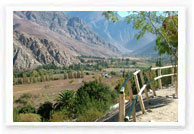Visas
 Visas are easy to forget, but you won’t get very far if you don’t have them! Not every country in the world requires a visa but many do and the process can vary quite a lot from one to another. Some visas can be arranged in advance for a fee, while some can be obtained on arrival. Whatever, you do, make sure you speak to us or do some research to work out exactly what you need and how to get it.
Visas are easy to forget, but you won’t get very far if you don’t have them! Not every country in the world requires a visa but many do and the process can vary quite a lot from one to another. Some visas can be arranged in advance for a fee, while some can be obtained on arrival. Whatever, you do, make sure you speak to us or do some research to work out exactly what you need and how to get it.
Generally you’ll need..
 A valid passport with a minimum 3 months validity beyond your return date and spare pages for visas to be attached. This is particularly important if you plan to travel in and out of multiple countries.
A valid passport with a minimum 3 months validity beyond your return date and spare pages for visas to be attached. This is particularly important if you plan to travel in and out of multiple countries.
 Plane ticket (or proof of purchase of one) showing details of onward journey. Most countries require this to prove that you’re visit is temporary rather than permanent. Most visas last for a limited time so your onward journey will have to fit these limitations.
Plane ticket (or proof of purchase of one) showing details of onward journey. Most countries require this to prove that you’re visit is temporary rather than permanent. Most visas last for a limited time so your onward journey will have to fit these limitations.
When it comes to visas nothing is more important than being organised! Here are a few tips to smooth the process:
 Whether sorting your visa by post or in person, make sure you have the right documents and details to hand, including any departure or arrival dates.
Whether sorting your visa by post or in person, make sure you have the right documents and details to hand, including any departure or arrival dates.
 When you receive your visa, check and double check the important details – if these aren’t correct you might be denied entry!
When you receive your visa, check and double check the important details – if these aren’t correct you might be denied entry!
 Be careful of timings. The best advice is always to apply for your visa well in advance, but in some cases your visa will be valid from date of issue rather than date of entry, so don’t get yours too early.
Be careful of timings. The best advice is always to apply for your visa well in advance, but in some cases your visa will be valid from date of issue rather than date of entry, so don’t get yours too early.
 Bring a couple of passport photos with you when you travel as many countries require these to process your visa – particularly if you’re getting in on the border rather than in advance.
Bring a couple of passport photos with you when you travel as many countries require these to process your visa – particularly if you’re getting in on the border rather than in advance.
Vaccinations & medicines
 You many not like it, but if you’re going to take a gap year and travel the world you’re going to have to put up with a few needles being stuck in your arm! What you need will depend where you go, but if you’re visiting anywhere tropical or countries in the developing world then it’s likely you’ll need a few jabs to see you through. Below are a few points to consider:
You many not like it, but if you’re going to take a gap year and travel the world you’re going to have to put up with a few needles being stuck in your arm! What you need will depend where you go, but if you’re visiting anywhere tropical or countries in the developing world then it’s likely you’ll need a few jabs to see you through. Below are a few points to consider:
 The most common vaccinations are typhoid, hepatitis and yellow fever but you should consult your doctor to find out exactly which ones you need. This will be affected not only by which country you plan to visit but by how long you’re planning to stay there and what you intend to do. In many countries, the threat of disease varies depending on which part of the country you’re in and what you’re coming into contact with. Those working with animals or in very basic or remote communities may need extra protection.
The most common vaccinations are typhoid, hepatitis and yellow fever but you should consult your doctor to find out exactly which ones you need. This will be affected not only by which country you plan to visit but by how long you’re planning to stay there and what you intend to do. In many countries, the threat of disease varies depending on which part of the country you’re in and what you’re coming into contact with. Those working with animals or in very basic or remote communities may need extra protection.
 If you’re from the UK, some vaccinations will be available free on the NHS. Malaria tablets and more exotic medicines and vaccines will cost money and you may need to order in advance.
If you’re from the UK, some vaccinations will be available free on the NHS. Malaria tablets and more exotic medicines and vaccines will cost money and you may need to order in advance.
 Be aware that lots of vaccinations and medicines require you to take a course of injections or tablets over a number of months. That means you need to start them well in advance of travel – you can’t cram them all in just before you leave! In fact, you should always leave a couple of weeks between your final dose and departure to give you time to develop full immunity and get over any side effects.
Be aware that lots of vaccinations and medicines require you to take a course of injections or tablets over a number of months. That means you need to start them well in advance of travel – you can’t cram them all in just before you leave! In fact, you should always leave a couple of weeks between your final dose and departure to give you time to develop full immunity and get over any side effects.
 Malaria is one to watch out for! As well as being one of the most common diseases for gap year travellers contend with, it’s one of the only ones that gives you a choice of medicines. The cost for these varies, as does the way they work and the side effects they come with, so the choice isn’t straightforward. As ever, the best advice is to consult your doctor, though tablets alone won’t do. Malaria is carried by mosquitoes so you’ll also need to buy some insect spray that contains deet.
Malaria is one to watch out for! As well as being one of the most common diseases for gap year travellers contend with, it’s one of the only ones that gives you a choice of medicines. The cost for these varies, as does the way they work and the side effects they come with, so the choice isn’t straightforward. As ever, the best advice is to consult your doctor, though tablets alone won’t do. Malaria is carried by mosquitoes so you’ll also need to buy some insect spray that contains deet.
This is by no means a comprehensive list so you should do what we tell all our gappers – go and see your doctor! We can give you pointers but when it comes to health you should only really listen to a qualified medical professional. If you want to find out more, take a look at the list of useful links at the bottom of this page.
Other things to watch out for
 Vaccinations take care of the most dangerous diseases but there are plenty of other things to watch out for. Most of these are common sense but it’s worth remembering to..
Vaccinations take care of the most dangerous diseases but there are plenty of other things to watch out for. Most of these are common sense but it’s worth remembering to..
 Be careful what you eat. Where possible only eat food that you know is fresh and properly cooked. In some cases food from street stalls can be safest as it’s cooked right in front of you!
Be careful what you eat. Where possible only eat food that you know is fresh and properly cooked. In some cases food from street stalls can be safest as it’s cooked right in front of you!
 Drink bottled water where necessary. In many foreign countries the water supply isn’t safe to drink straight from the taps and you should be wary of any ice given to you in drinks.
Drink bottled water where necessary. In many foreign countries the water supply isn’t safe to drink straight from the taps and you should be wary of any ice given to you in drinks.
 Apply sunscreen and wear a hat to avoid getting sunburn. It’s tempting to work up an impressive tan, but if you’re on the road then there’s nothing worse than getting sunstroke or badly burnt.
Apply sunscreen and wear a hat to avoid getting sunburn. It’s tempting to work up an impressive tan, but if you’re on the road then there’s nothing worse than getting sunstroke or badly burnt.
 Take the usual precautions to avoid spreading sexually transmitted diseases. Travelling isn’t an excuse to be irresponsible so invest in some condoms!
Take the usual precautions to avoid spreading sexually transmitted diseases. Travelling isn’t an excuse to be irresponsible so invest in some condoms!
Useful links